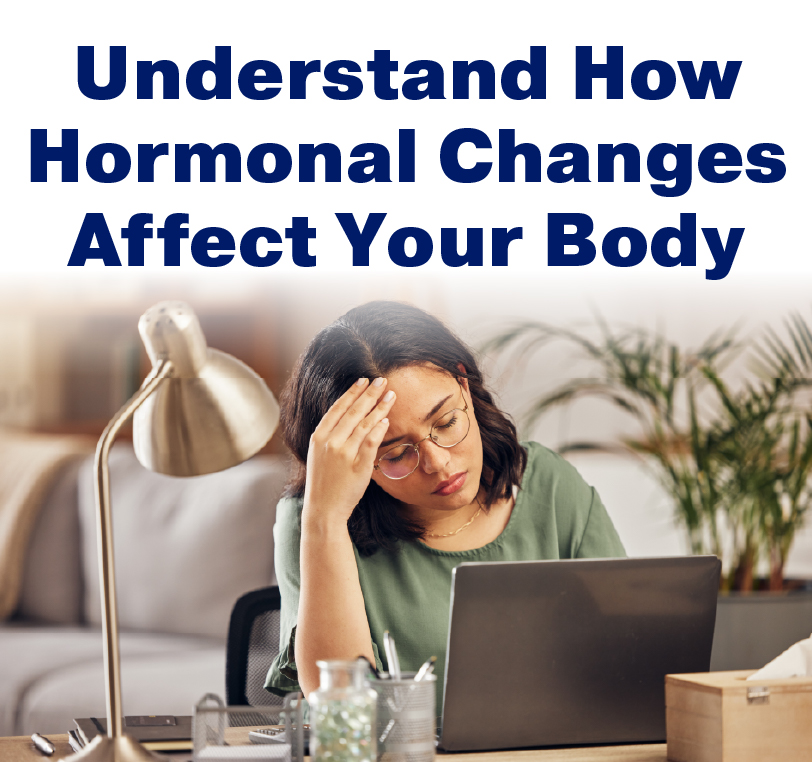How hormonal changes affect your body and what you can do about it
Understand How Hormonal Changes Affect Your Body
Hormones are chemical messengers released by glands like the thyroid, adrenals, ovaries, and testes. They travel through the bloodstream, regulating metabolism, mood, energy, growth, reproduction, and more. Even small imbalances can have noticeable effects, from fatigue and mood swings to changes in weight or libido. Hormones work in feedback loops, and when these loops are disrupted by age, stress, disease, or lifestyle factors, the body can feel out of balance.
Life Stages and Hormonal Shifts
Hormones fluctuate across life stages. Puberty sparks growth and reproductive maturity. Women experience shifts during menstruation, pregnancy, postpartum, and menopause, affecting mood, sleep, and metabolism. In men, testosterone gradually declines after 30, often causing fatigue, low libido, and muscle loss.
Lifestyle plays a role too. Chronic stress raises cortisol, poor sleep disrupts hormone balance, and irregular routines or night shifts can change circadian rhythms, leading to fatigue and metabolic issues.
How Hormonal Changes Affect Daily Life
Shifts in hormones can manifest physically and mentally. Physical effects include changes in metabolism and weight, skin and hair issues, and sexual or reproductive health challenges. Hormones like insulin, thyroid hormones, and sex steroids influence fat storage and energy use, while estrogen and androgens affect skin elasticity, acne, or hair thinning. Irregular periods, erectile issues, hot flashes, or low libido often point to hormonal shifts.
Mentally, fluctuating estrogen, progesterone, testosterone, and cortisol can alter mood, focus, and energy. Cortisol and melatonin regulate circadian rhythms, so imbalances can cause people to feel drained in the morning and wired at night.
When Hormonal Changes Signal a Medical Condition
While some hormonal shifts are normal, persistent symptoms may indicate underlying disorders. Common conditions include:
-
Thyroid Disorders: Hypothyroidism slows metabolism, causing fatigue, weight gain, constipation, and dry skin; hyperthyroidism speeds up processes, leading to weight loss, palpitations, and anxiety.
-
PCOS (Women): High androgen levels and insulin resistance can cause irregular periods, acne, excess hair growth, and fertility issues.
-
Male Hypogonadism: Persistently low testosterone may lead to fatigue, muscle loss, and low libido.
-
Cushing’s Syndrome and Adrenal Disorders: Excess cortisol can cause rapid weight gain, muscle weakness, and skin changes.
Getting the Right Diagnosis
Targeted testing is essential. Thyroid issues are screened with TSH and sometimes free T4 or antibody tests. Women with irregular periods or PCOS symptoms may have tests for testosterone, DHEA-S, prolactin, LH/FSH, and sometimes ultrasounds. Men suspected of hypogonadism need two early-morning testosterone readings. Adrenal function requires specialised tests like late-night salivary cortisol or 24-hour urine tests. Metabolic health can be assessed through fasting glucose, HbA1c, and lipid profiles.
Balancing Hormones
Lifestyle is the foundation of hormone balance. Exercise improves insulin sensitivity and boosts energy. The right nutrition and reducing processed carbs can help maintain better hormone health, like PCOS. Regular sleep helps maintain cortisol, melatonin, and growth hormone cycles, while stress management through meditation, therapy, or breathing exercises keeps cortisol levels in check.
Understanding your hormones empowers you to recognise imbalances and make informed choices for better health.
